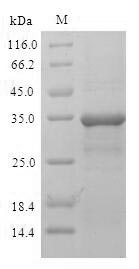Human Malignant T-cell-amplified sequence 1 Recombinant Protein Product Attributes
Product Type: Recombinant Protein
Recombinant Malignant T-cell-amplified sequence 1 based upon sequence from: Human
Host: QP8252 protein expressed in E. coli.
Tag: His-SUMO
Protein Construction: A DNA sequence encoding the Homo sapiens (Human) Malignant T-cell-amplified sequence 1, was expressed in the hosts and tags indicated. Please select your host/tag option, above.
Application Notes: Please contact us for application specific information for QP8252.
Bioactivity Data: Untested
Full Length? Full Length
Expression Region: Met1 – Lys181
Amino Acid Sequence: MFKKFDEKEN VSNCIQLKTS VIKGIKNQLI EQFPGIEPWL NQIMPKKDPV KIVRCHEHIE ILTVNGELLF FRQREGPFYP TLRLLHKYPF ILPHQQVDKG AIKFVLSGAN IMCPGLTSPG AKLYPAAVDT IVAIMAEGKQ HALCVGVMKM SAEDIEKVNK GIGIENIHYL NDGLWHMKTY K
Purity: Greater than 90% as determined by SDS-PAGE.
Reconstitution Instructions:
Concentration of Human Malignant T-cell-amplified sequence 1 Protein:
Endotoxin Levels: Not determined.
Buffer: Tris-based buffer, 50% glycerol
Storage Conditions: Store at -20C to -80C.
| Recombinant Human Malignant T-cell-amplified sequence 1 Protein General Information | |
|---|---|
| Alternate Names | |
| MCT1; MCT-1 | |
| Curated Database and Bioinformatic Data | |
| Gene Symbol | MCTS1 |
| Entrez Gene ID | 28985 |
| Ensemble Gene ID | ENSG00000232119 |
| RefSeq Protein Accession(s) | NP_001131026.1 |
| RefSeq mRNA Accession(s) | NM_001137554.1, NM_014060.2 |
| UniProt ID(s) | Q9ULC4 |
| UniGene ID(s) | Hs.102696 |
| HGNC ID(s) | HGNC:23357 |
| COSMIC ID Link(s) | MCTS1 |
| KEGG Gene ID(s) | hsa:28985 |
| PharmGKB ID(s) | PA128394649 |
| General Description of Recombinant Human Malignant T-cell-amplified sequence 1 Protein. | |
| Anti-oncogene that play a role in cell cycle regulation; decreases cell doubling time and anchorage-dependent growth; shortens the duration of G1 transit time and G1/S transition. When constituvely expressed, increases CDK4 and CDK6 kinases activity and CCND1/cyclin D1 protein level, as well as G1 cyclin/CDK complex formation. Involved in translation initiation; promotes recruitment of aminoacetyled initiator tRNA to P site of 40S ribosomes. Can promote release of deacylated tRNA and mRNA from recycled 40S subunits following ABCE1-mediated dissociation of post-termination ribosomal complexes into subunits. Plays a role as translation enhancer; recruits the density-regulated protein/DENR and binds to the cap complex of the 5′-terminus of mRNAs, subsequently altering the mRNA translation profile; up-regulates protein levels of BCL2L2, TFDP1, MRE11A, CCND1 and E2F1, while mRNA levels rains constant. Hyperactivates DNA damage signaling pathway; increased gamma-irradiation-induced phosphorylation of histone H2AX, and induces damage foci formation. Increases the overall number of chromosomal abnormalities such as larger chromosomes formation and multiples chromosomal fusions when overexpressed in gamma-irradiated cells. May play a role in promoting lymphoid tumor development: lymphoid cell lines overexpressing MCTS1 exhibit increased growth rates and display increased protection against apoptosis. May contribute to the pathogenesis and progression of breast cancer via promotion of angiogenesis through the decline of inhibitory THBS1/thrombospondin-1, and inhibition of apoptosis. Involved in the process of proteasome degradation to down-regulate Tumor suppressor p53/TP53 in breast cancer cell; Positively regulates phosphorylation of MAPK1 and MAPK3. Involved in translation initiation; promotes aminoacetyled initiator tRNA to P site of 40S ribosomes. Can promote release of deacylated tRNA and mRNA from recycled 40S subunits following ABCE1-mediated dissociation of post-termination ribosomal complexes into subunits | |
Limitations and Performance Guarantee
This is a life science research product (for Research Use Only). This product is guaranteed to work for a period of two years when stored at -70C or colder, and one year when aliquoted and stored at -20C.




There are no reviews yet.